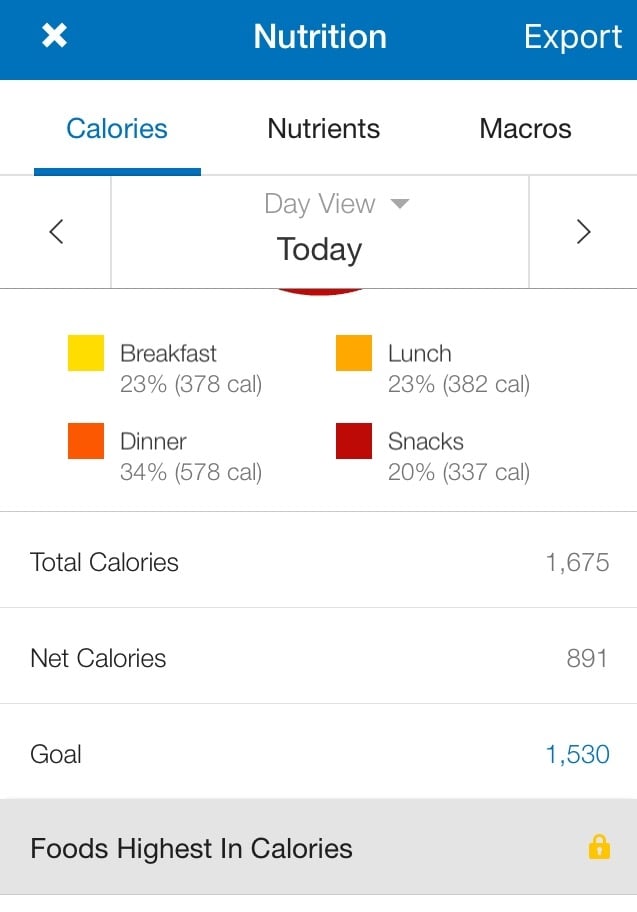Total calories? Net calories? Agh!! So confused! Can someone help?

Hungry_Shopgirl
Posts: 329 Member
Explain to me like I'm 5: what does "net calories" here mean?


0
Replies
-
Not sure...but I would always default to the total calories.0
-
net calories are total calories eaten/drunk less exercise0
-
Calories eaten - calories burned. Did you log 784 calories in exercise?0
-
Stella3838 wrote: »Calories eaten - calories burned. Did you log 784 calories in exercise?
Yes. So is the "net calories" number my deficit for the day? If not, what do I need it for?0 -
The same thing net pay means.
Net pay is total money left after withholdings.
Net cals is total energy left after exercise (at least in MFP jargon).3 -
MFP uses net calories to tell you how close you are to your goal. At the end of the day, net calories and goal calories should be equal. It is actually total calories that you should be ignoring.0
-
Hungry_Shopgirl wrote: »Stella3838 wrote: »Calories eaten - calories burned. Did you log 784 calories in exercise?
Yes. So is the "net calories" number my deficit for the day? If not, what do I need it for?
MFP is designed for you to eat back your exercise calories. Your goal is 1530, yet you've only net eaten 891 after exercise. MFP method would say you need to eat 784 calories to get to your 1530 goal.
Now, a couple things. How did the 784 calorie burn get calculated? Most methods are an overestimation. The general guideline is to eat 50-75% of the exercise calories back. So:
You're already eaten 1675.
You burned 784.
You have net eaten 891.
You should then eat 392 (50% of exercise calories) to 588 (75% of exercise calories) more calories today to get you closer to that 1530 goal.
You might have to figure out what percentage works for you, depending on how accurate those calories burned are. Personally, I do closer to 75%, but I have a fairly high confidence in what I burn. I'm losing .5 - 1 pound per week, once I figured out what worked for me.1 -
MFP does not show your deficit in their calculations. It is implied based on the weight loss goal you selected.
Such as if you selected 1 pound per week, and MFP gave you a goal 1530, then eating 1530 will result in a deficit of 500 per day assuming you chose the correct activity level. MFP expects you to burn 2030 in this scenario. If you exercise, you burn more. If 784 is accurate then your daily burn would be about 2800. So eating 1675 would be a deficit of over 1000. But its easy to overinflate exercise #s. And you're estimating on activity level. SO if you feel fine/satiated/energetic eating what you have, then you're probably ok to leave it.
THere is a lot of guesswork involved...0 -
Hungry_Shopgirl wrote: »Stella3838 wrote: »Calories eaten - calories burned. Did you log 784 calories in exercise?
Yes. So is the "net calories" number my deficit for the day? If not, what do I need it for?
Your calorie deficit was given to you before exercise. So your exercise calories could potentially make the deficit larger than you intended, and/or larger than is healthy.
Larger deficits (especially closer to goal) make it harder for your body to support existing lean muscle mass. Do you want weight loss or a smaller body fat %?
Now for the hard part. Calorie burns are estimates. Some forms are easier to estimate than others. A great many people start by eating back 50% of their exercise calories. Then they tweak that number up or down (over time) based on actual results.0 -
Ok, thank you all for explaining it clearly, I think I understand.
It looks like a big deficit for the day, but considering I didn't have a great week I'm hoping a bit more margin today might help offset some bad days I had. I think that's like "banking" calories? Except it was unplanned. 0
0 -
By the way, for those who asked how I calculated that calorie burn: I did one of fitness blenders "1000 calorie workouts", which are pretty intense and 1.5 hs long. I did the high impact version of all the exercises, but logged about 700 instead of 1000 to account for calorie burn overestimation (according to fitnessblender, that workout would burn at least 400 cal and at most 1000).1
-
Others already explained calorie burn. Basically if you find you plateau lessen the calorie burn number and go with actually calories consumed. Especially for shorter people, but pretty much estimating calorie burns for most people hinders their ability to actually be in deficit. The shorter you are, the smaller your metabolism, the least room you have for that narrow calorie window between a healthy deficit and your maintenance (actual calorie needs per day).0
-
Calorie burn will depend on your size, intensity, activity, duration so I have no way of knowing how accurate it is.
 Just in future situations be aware that we often burn less than we think.
Just in future situations be aware that we often burn less than we think. 
And yes, a low deficit other days combined with a high deficit today can help offset each other.0 -
StaciMarie1974 wrote: »Just in future situations be aware that we often burn less than we think
I agree, which is why I always log the lower end of the calorie burn estimate and even then try not to eat all of my exercise calories back. The problem is that I've been really hungry lately and found myself not being able to fall asleep because of it. But then I feel guilty about eating more of those calories.
Anyways, I'm 6'2", I don't think it's unreasonable to think I would burn around 700 calories during 90 minutes of strenuous exercise. I guess this was a bad day to ask for help with understanding this feature in the app since I should have known people would assume I'm overestimating calorie burn!
But thank you all for the help. I think I understand now. If my calculations are correct then I should maintain this week. If I lose or gain then I'll know I have to adjust what I'm tracking.0 -
ahhh, you'll always burn more calories than me. At 6'2" your ideal/goal weight will be higher the average female. (Assumption on my part is that 5'4-5'7 is average?) Meaning your TDEE, exercise burn will also be higher than 'average'. Not a bad thing!1
-
As others have mentioned, net calories factors in exercise. What I'd like to add is that this is can be a bit problematic for a few reasons:
- It overly complicates these things. Sticking to a solid diet and exercise is hard enough already. Adding and subtracting calories as you go makes it that much harder.
- As long as you're eating above your BMR (Basal Metabolic Rate - the minimum number of calories you burn in a day, or what you'd burn if you laid motionless in bed) then there's no need to eat more. If you don't exercise at all, then you'll maintain your weight that day. If you exercise, you'll lose weight. The more you exercise, the greater the deficit. There's no need to close the gap if you don't want to, but that's something you'll feel encouraged to do if you pay attention to "net calories."
0 -
The same thing net pay means.
Net pay is total money left after withholdings.
Net cals is total energy left after exercise (at least in MFP jargon).
This is a really great way to explain it. You're supposed to be 18+ to have an account here, so everybody in this thread should be able to understand this and relate to it. While the idea and jargon may be new, the concept is really simple and not confusing at all.Hungry_Shopgirl wrote: »Anyways, I'm 6'2", I don't think it's unreasonable to think I would burn around 700 calories during 90 minutes of strenuous exercise.
That's not unreasonable at all.0 -
itsthehumidity wrote: »As others have mentioned, net calories factors in exercise. What I'd like to add is that this is can be a bit problematic for a few reasons:
- It overly complicates these things. Sticking to a solid diet and exercise is hard enough already. Adding and subtracting calories as you go makes it that much harder.
- As long as you're eating above your BMR (Basal Metabolic Rate - the minimum number of calories you burn in a day, or what you'd burn if you laid motionless in bed) then there's no need to eat more. If you don't exercise at all, then you'll maintain your weight that day. If you exercise, you'll lose weight. The more you exercise, the greater the deficit. There's no need to close the gap if you don't want to, but that's something you'll feel encouraged to do if you pay attention to "net calories."
That is not correct.
If you do not exercise, you need to eat your NEAT calories, which is (BMR + daily activity) in order to maintain. Eating somewhere between BMR and NEAT will cause you to lose weight.
(NEAT - deficit) is the Goal given by MFP.
It is also not correct that you never need to eat back exercise calories. MFP already has a deficit calculated into the goal. If exercise calories are not eaten back, weight loss may exceed a healthy rate. Many pick the maximum weight loss rate and a sedentary activity setting even if it is not appropriate for what they have to lose. These people and those who do a lot of exercise would be most at risk.0 -
itsthehumidity wrote: »As others have mentioned, net calories factors in exercise. What I'd like to add is that this is can be a bit problematic for a few reasons:
- It overly complicates these things. Sticking to a solid diet and exercise is hard enough already. Adding and subtracting calories as you go makes it that much harder.
- As long as you're eating above your BMR (Basal Metabolic Rate - the minimum number of calories you burn in a day, or what you'd burn if you laid motionless in bed) then there's no need to eat more. If you don't exercise at all, then you'll maintain your weight that day. If you exercise, you'll lose weight. The more you exercise, the greater the deficit. There's no need to close the gap if you don't want to, but that's something you'll feel encouraged to do if you pay attention to "net calories."
Given that the body can only metabolize a certain amount of fat from fat stores in a day, closing the gap will prevent unnecessary muscle loss. This won't necessarily apply to people with smaller deficits or lower levels of activity, but it can be very important for people who are on lower calorie diets or who exercise more.
1 -
Hungry_Shopgirl wrote: »Stella3838 wrote: »Calories eaten - calories burned. Did you log 784 calories in exercise?
Yes. So is the "net calories" number my deficit for the day? If not, what do I need it for?
Your GOAL of 1,530 is your deficit. As it is, with your exercise, even though you've grossed 1,600, it's as if you only ate 891 calories...your net and your GOAL should be pretty close...essentially, you're not eating enough.0
This discussion has been closed.
Categories
- All Categories
- 1.4M Health, Wellness and Goals
- 395.4K Introduce Yourself
- 44.1K Getting Started
- 260.7K Health and Weight Loss
- 176.2K Food and Nutrition
- 47.5K Recipes
- 232.7K Fitness and Exercise
- 445 Sleep, Mindfulness and Overall Wellness
- 6.5K Goal: Maintaining Weight
- 8.6K Goal: Gaining Weight and Body Building
- 153.2K Motivation and Support
- 8.2K Challenges
- 1.3K Debate Club
- 96.4K Chit-Chat
- 2.5K Fun and Games
- 4.3K MyFitnessPal Information
- 16 News and Announcements
- 1.3K Feature Suggestions and Ideas
- 2.9K MyFitnessPal Tech Support Questions












